 Don Lerch, Lifetime Broadcast Council-Emeritus member, who resides in Juno Beach, FL, tops the NAFB list of longtime members at 70 years. At 97 years young, he recalled his early farm broadcasting years in a phone call on June 1. He began his farm broadcasting career on June 9, 1941, at KDKA (Pittsburgh, PA), a Westinghouse-owned station and part of the NBC Red Network. He had just graduated from Penn State University with a degree in agronomy. Recommended by County Extension Agent Henry Eby, Don got the job with a starting salary of $1,800 for a six-day week. During the early years, the Federal Communications Commission required major stations to broadcast information for farmers. Don interviewed county agents and farmers, but remote broadcasts were difficult because of equipment limitations then. During the war years, food supply was a key topic. He remembers his broadcast on December 8, 1941, for farmers had a heavy emphasis on producing more food both for domestic and overseas use. On July 13, 1943, Don joined the War Food Administration in Washington, DC.
Don Lerch, Lifetime Broadcast Council-Emeritus member, who resides in Juno Beach, FL, tops the NAFB list of longtime members at 70 years. At 97 years young, he recalled his early farm broadcasting years in a phone call on June 1. He began his farm broadcasting career on June 9, 1941, at KDKA (Pittsburgh, PA), a Westinghouse-owned station and part of the NBC Red Network. He had just graduated from Penn State University with a degree in agronomy. Recommended by County Extension Agent Henry Eby, Don got the job with a starting salary of $1,800 for a six-day week. During the early years, the Federal Communications Commission required major stations to broadcast information for farmers. Don interviewed county agents and farmers, but remote broadcasts were difficult because of equipment limitations then. During the war years, food supply was a key topic. He remembers his broadcast on December 8, 1941, for farmers had a heavy emphasis on producing more food both for domestic and overseas use. On July 13, 1943, Don joined the War Food Administration in Washington, DC.
Food rationing was in place so many of the stories he wrote or broadcast were designed to keep citizens informed and encourage their compliance. Also, farm broadcasters did their part in promoting Victory Gardens by Americans to help grow their own food. He was hired by WNBC in New York City on October 25, 1946. He later worked for Edward R. Murrow, who was CBS Director of News. Don produced a half-hour weekly program, Columbia’s Country Journal, which aired on Saturdays. Besides agriculture, he carried stories about country life and accepted inserts to his program from farm broadcasters. In 1953, the advent of television caused the show’s budget to be cut and the program was shortened to 15 minutes. In 1959, he started his own firm, Lerch and Company, Inc., where he continued to work with farm broadcasters feeding them broadcasts for their programs. He continued to specialize in agriculture, but diversified after the war into conveying information about oil production and remembers taking farm broadcasters out to an ocean oil platform. He met Layne R. Beaty, when Layne was farm director at WBAP in Fort Worth, TX. Layne was the third President of NAFB in 1947. Later, Layne became Chief of Radio and Television for USDA. (EDITOR’S NOTE: Layne was my boss when I moved to DC in 1974 to head USDA’s Television Service.)
Don and Layne were among the early-year members of NAFB. Don recalls attending NAFB meetings in Columbus, OH, and at the Stevens Hotel (now Conrad Hilton Hotel) in Chicago. He also worked with Roy Battles, NAFB President in 1950, when Roy was spokesman for the National Grange. Don said, “I believe farm broadcasting is one of the best professions in the world. As a farm broadcaster, I learned that I needed to not only talk to farmers, but also to talk for farmers.” (Sounds like today’s concept of “airing on the side of agriculture.”) Don’s advice to farm broadcasters today is to work closely with food companies in helping consumers to understand where their bacon and eggs come from. Those who know Don remember he had a passion for golf, but he gave up the sport when he was 95. He admits to still having a putter and practices hitting the golf ball into a cup. Don is one of the NAFB legends who contributed much to farm broadcasting as a network broadcaster, and his golden voice still remains after decades of telling the story of agriculture to listeners nationwide. He enjoys reading about farm broadcasting colleagues, old and new, through this newsletter.
